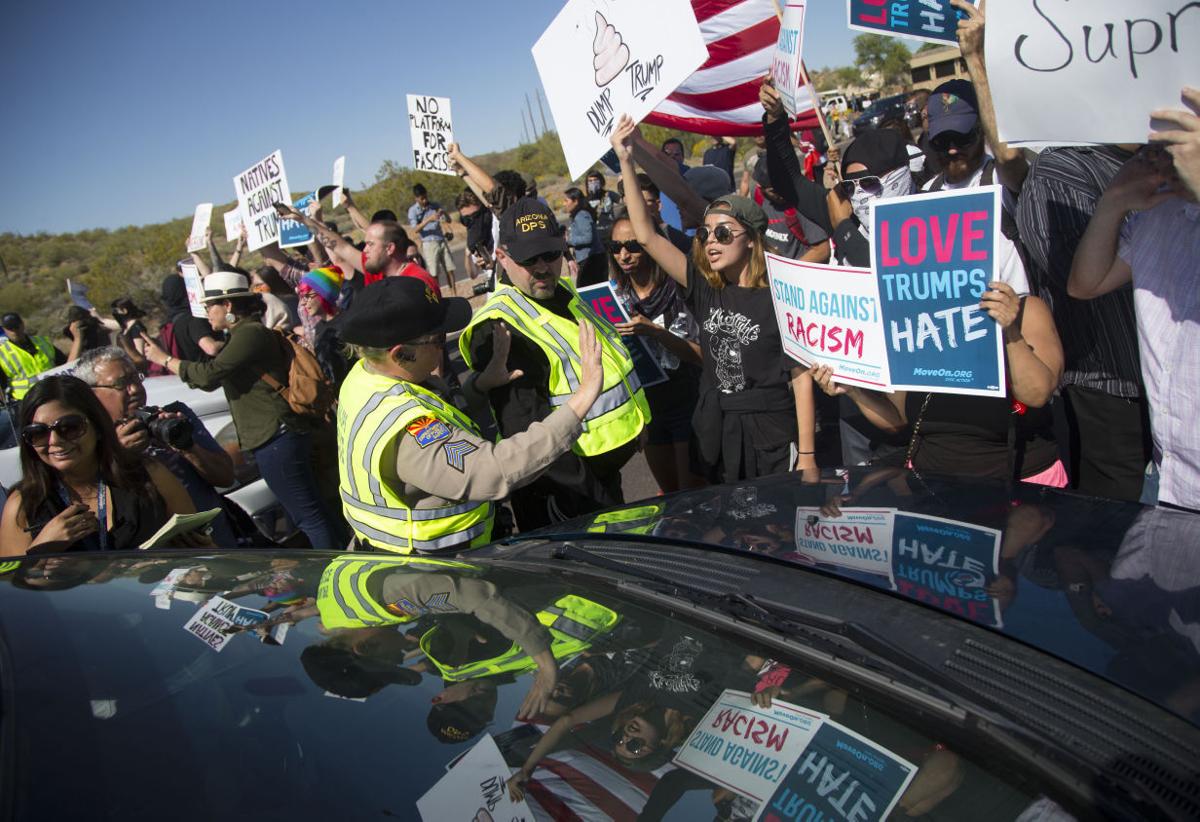PHOENIX — Upset with protesters who tried to block a Donald Trump rally last month in Fountain Hills, Republican state senators voted Thursday to allow judges to impose six-month jail terms on those who stop traffic headed to political rallies.
Sen. John Kavanagh who lives in the community and whose wife is the mayor acknowledged it’s already a Class 3 misdemeanor to block traffic.
But he said the maximum penalty of 30 days in jail and a $500 fine might be appropriate for someone “being rowdy on Mill Avenue (in Tempe) and blocking a car.”
What was happening here, Kavanagh said, is people were prevented from going to the event. And he said the intent was even to keep Trump from showing up.
“I consider that kind of behavior to be extremely corrosive to democracy,” he said. So he tacked an amendment onto HB 2548 to increase the offense to a Class 1 misdemeanor with a maximum penalty of six months in jail and a $2,500 fine if someone is acting to intentionally block access to a government meeting, government hearing or political campaign event.
Sen. Steve Farley, D-Tucson, said the provision is unconstitutional.
He said state lawmakers are free to decide what penalty to impose for blocking a street. What they cannot legally do, Farley said, is decide that someone’s motive for impeding traffic makes that person subject to a harsher penalty.
And Farley said that’s particularly true in this case where those who parked their cars in the street, chained themselves to their vehicles and otherwise blocked traffic were exercising their First Amendment rights to make a political point.
“One man’s blocking a political event is another man’s expression of political beliefs,” he said, predicting the enhanced penalty will be struck down by the courts.
That drew an angry reaction from Kavanagh.
“To stop somebody from going to a political rally to hear a candidate is not furthering the First Amendment,” he said. “It is suppressing that person’s First Amendment right to assembly.”
Ditto, Kavanagh said, of stopping traffic to prevent a candidate from getting to an event.
“It is suppressing the candidate’s First Amendment right to free speech,” he said.
Dozens of protesters blocked Shea Boulevard, the main route into Fountain Hills, ahead of Trump’s scheduled rally there.
It did not keep Trump, Gov. Jan Brewer or Maricopa County Sheriff Joe Arpaio from the event.
Sen. Martin Quezada, D-Phoenix, said there’s no reason for the legislation. He said some people who refused to move were arrested and will be held accountable.
But state Sen. Jeff Dial, R-Chandler, had a different perspective, saying he was one of what he thought were about 5,000 people headed to the rally who did get caught in traffic.
“Clearly, the penalty wasn’t high enough,” Dial said of the current maximum 30-day jail term. “These individuals chose to engage in this act knowing that they likely would get arrested.”
Dial said he ended up driving over the median and turning around, at least in part to stop an 8-year-old girl he was taking to the rally from being “terrorized by protesters.” But he said that was only half the harm done to her.
“You ended up with a little girl who was trying to formulate her political ideas, and she ends up being terrified,” Dial said, and never getting to the event.
Quezada, however, saw a different agenda by proponents of the measure.
“Are we making any points at all aside from a political point and an expression for support of one particular presidential candidate,” he said.
Kavanagh called it “somewhat offensive” that Quezada would suggest the measure is all about Trump.
“Today Trump, tomorrow Clinton, the next day Cruz, the next day Sanders,” Kavanagh said.
“This can happen to any candidate because no side of the political spectrum is immune from having radical people who disrespect other people’s rights,” he continued. “Both sides should be punished when they do that.”
The new language was incorporated into a House-passed bill that forbids state universities and community colleges from unlawfully restricting a student’s right to speak. The measure is designed to keep schools from limiting protests and similar events to only certain areas of a campus and from imposing other unnecessary rules.
A final Senate vote is needed before the measure goes back to the House, which never had considered the provisions on blocking traffic.





